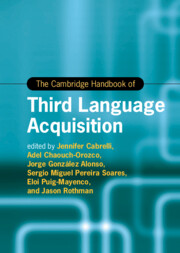Book contents
- The Cambridge Handbook of Third Language Acquisition
- Cambridge Handbooks in Language and Linguistics
- The Cambridge Handbook of Third Language Acquisition
- Copyright page
- Contents
- Figures
- Tables
- Contributors
- Introduction Multilingualism
- Part I Theoretical Approaches to L3/Ln
- 1 Generative Approaches to Third Language Acquisition
- 2 The Usage-Based Approach
- 3 Third Language Acquisition from a Complexity Dynamic Systems Theory Approach
- 4 A Critical Sociolinguistics Perspective on L3 Acquisition
- Part II L3/Ln across Linguistic Domains
- Part III Becoming and Staying Multilingual at Different Ages
- Part IV L3/Ln in Action
- Part V L3/Ln and Cognition
- Part VI Research Methods in L3/Ln
- Index
- References
1 - Generative Approaches to Third Language Acquisition
from Part I - Theoretical Approaches to L3/Ln
Published online by Cambridge University Press: 13 July 2023
- The Cambridge Handbook of Third Language Acquisition
- Cambridge Handbooks in Language and Linguistics
- The Cambridge Handbook of Third Language Acquisition
- Copyright page
- Contents
- Figures
- Tables
- Contributors
- Introduction Multilingualism
- Part I Theoretical Approaches to L3/Ln
- 1 Generative Approaches to Third Language Acquisition
- 2 The Usage-Based Approach
- 3 Third Language Acquisition from a Complexity Dynamic Systems Theory Approach
- 4 A Critical Sociolinguistics Perspective on L3 Acquisition
- Part II L3/Ln across Linguistic Domains
- Part III Becoming and Staying Multilingual at Different Ages
- Part IV L3/Ln in Action
- Part V L3/Ln and Cognition
- Part VI Research Methods in L3/Ln
- Index
- References
Summary
This chapter provides an introduction to formal linguistic approaches to third language acquisition. A substantial body of work on sequential multilingualism has been produced in the last two decades under assumptions and theoretical constructs that followed from the generative tradition in second language acquisition. My aim in this chapter is to briefly survey the main theories, models, and proposals originated in this subfield, and to highlight which of the assumptions in the tradition of generative grammar bring them together as a coherent approach to the acquisition of third or further languages. Some of these are, essentially, questions the field inherited from second language acquisition; others are core theoretical concepts from the generative enterprise. The recognition of these common bases and goals can help future work on these models focus on moving the field forward as a whole.
Information
- Type
- Chapter
- Information
- The Cambridge Handbook of Third Language Acquisition , pp. 23 - 42Publisher: Cambridge University PressPrint publication year: 2023
References
Accessibility standard: Unknown
Why this information is here
This section outlines the accessibility features of this content - including support for screen readers, full keyboard navigation and high-contrast display options. This may not be relevant for you.Accessibility Information
- 3
- Cited by
